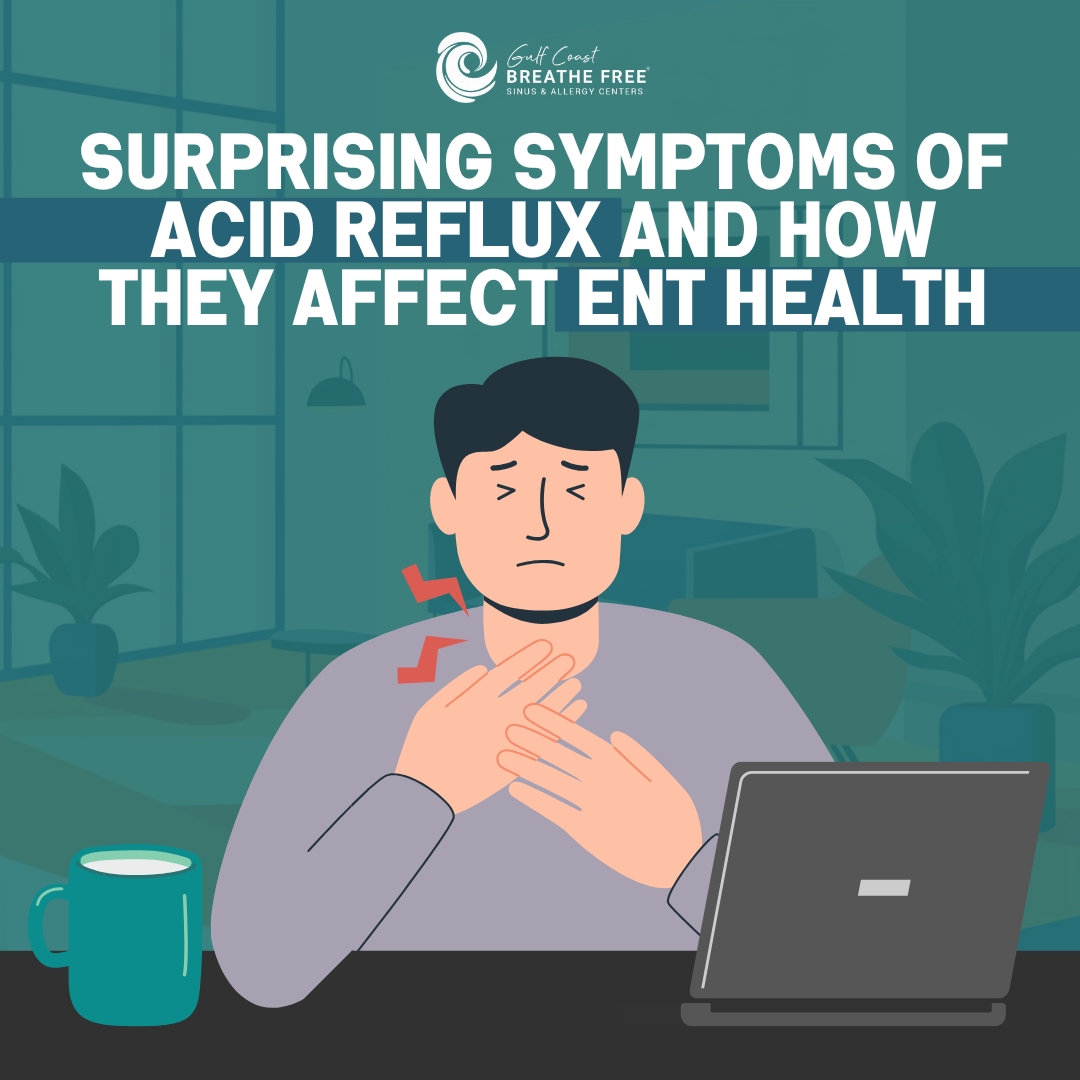Surprising Symptoms of Acid Reflux and How They Affect ENT Health
That persistent throat clearing during your morning meeting. The mysterious hoarseness that appears without a cold. The sensation of something caught in your throat that no amount of swallowing seems to dislodge. These seemingly disconnected experiences might actually share a common source: acid reflux. While most people associate reflux with heartburn and digestive discomfort, its effects frequently manifest in unexpected ways throughout your ear, nose, and throat regions.
Here along the Gulf Coast, where our love for spicy seafood, evening social gatherings, and relaxed dining cultures intersect, these reflux-related ENT symptoms can be particularly prevalent yet frequently misattributed to other causes. Understanding this relationship empowers you to recognize patterns in your own health experience and seek more precise, effective care.

What is Acid Reflux?
Acid reflux happens when stomach acid moves up into the esophagus, the tube that connects your throat to your stomach. When this happens often, it’s called gastroesophageal reflux disease (GERD). Some people also experience laryngopharyngeal reflux (LPR), where acid reaches the throat and voice box, causing different symptoms than typical heartburn.
Surprising Symptoms of Acid Reflux
While heartburn and indigestion are common with reflux, it can also cause:
- Chronic Cough
If you have a nagging cough that won’t go away, acid reflux could be the reason. When acid reaches the throat, it can irritate the tissues and trigger a cough. This often happens at night or after eating.
- Sore Throat That Won’t Heal
A sore throat that lingers without signs of a cold could be caused by acid exposure. Unlike a regular sore throat, this type may not come with congestion or fever.
- Hoarseness or Voice Changes
If your voice sounds raspy or weak, especially in the morning, reflux could be irritating your vocal cords. Some people find their voice gets better as the day goes on, only to become hoarse again the next morning.
- Feeling of a Lump in the Throat
Some people with LPR feel like something is stuck in their throat even when they haven’t eaten anything. This is called globus sensation and happens when reflux causes swelling or irritation.
- Postnasal Drip and Throat Clearing
Reflux can cause extra mucus to build up in the throat, leading to a feeling of postnasal drip. This often makes people clear their throat frequently, which can make irritation worse.
- Ear Pain or Fullness
Stomach acid can irritate the tubes that connect your throat to your ears (Eustachian tubes), causing ear discomfort or a sense of fullness. While acid doesn’t reach the ears directly, inflammation in the throat can affect them.
How to Reduce Acid Reflux Symptoms
If you’re experiencing these symptoms, there are steps you can take to reduce acid reflux and protect your ENT health.
- Avoid trigger foods – Spicy, fried, and acidic foods (like tomatoes and citrus) can make reflux worse.
- Eat smaller meals – Large meals put more pressure on the stomach, increasing the chance of acid rising.
- Stay upright after eating – Lying down too soon after meals can cause reflux symptoms to flare up.
- Limit caffeine and alcohol – These can relax the muscle that keeps acid in the stomach, making reflux more likely.
- Raise your head while sleeping – Using an extra pillow or a wedge pillow can help keep acid down while you rest.
When to See a Doctor
If you have persistent throat symptoms, voice changes, or a chronic cough, it’s worth getting checked. Acid reflux can be managed with the right approach, and treating it can help prevent long-term damage to your throat and vocal cords. If lifestyle changes don’t help, a doctor can suggest other treatments to keep symptoms under control.
Beyond Discomfort: Protecting Your Long-Term Vocal Health
The relationship between what happens in your stomach and how it affects your ears, nose, and throat represents a profound example of how interconnected our body systems truly are. At Gulf Coast Breathe Free, we approach this connection not as a collection of isolated symptoms to manage, but as an opportunity to restore balance to these essential pathways that enable communication, expression, and sensory experience.
What many dismiss as a "throat thing" or simply "getting older" often reflects a deeper pattern that, when properly understood, responds remarkably well to targeted approaches. The voice teacher who regains vocal resilience, the grandmother who no longer struggles to read bedtime stories, the professional who presents confidently without constant throat clearing—these transformations stem not from treating symptoms in isolation, but from addressing the underlying acid exposure that initiated the cascade.
Your voice matters. Let's help it be heard clearly.

.jpg)